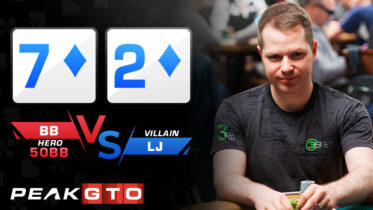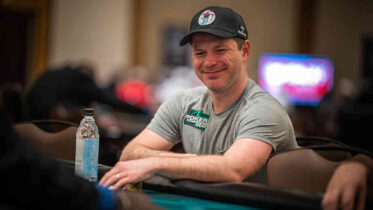Taking the leap from 9-max or full-ring to short-handed play is tough. Full-ring play has a slower, more relaxing pace, giving you all the time in the world to make quality decisions. You can even manage to use a hand chart and play multiple tables. Short-handed play has more playback and postflop play because there are fewer people and wider ranges, making for more hands an hour. So, if you want to advance your poker skills, then you need to perfect your short-handed game.
How To Transition To Short-handed Games
Apply this to all short-handed games, except for heads-up play.
Same Game – Fewer Players
Button, Cutoff, Hijack, Lowjack Ranges Remain the Same
Your ranges for which hands you can open from the small blind, the button, and from all positions remains the same.
Pretend The First Three Seats Folded In A 9-Max Game, Every Hand
The easiest way to adjust to short-handed play is to pretend the first 3 seats have folded every hand. You no longer have an under the gun range, so if you’re playing 6-max and you’re under the gun, it’s the same as if you were playing 9-max with the first three seats folding.
Strategy Wise – Everything Remains The Same
Strategy wise everything remains the same. The only real difference is since those first three seats don’t exist, you could face more late or middle position opens. People will also open a wider range and play more marginal hands then they would in 9-max; where ranges are tighter. So people will play more honestly in response.
What NOT To Do
Start Opening 50% Of Hands From Every Position
Moving to short-handed play, it may feel like people are raising more frequently, but that’s just because they’re playing their middle position range in a later position; rather than early. Whether playing 9-max or 6, ignore the first three seats and don’t start opening 50% of hands from every position. Be positionally aware. Play the most hands when you’re on the button and progressively less the worse your position is.
3-Bet Every Hand Because “Nobody Gets A Hand Short-handed”
3-bet when your opponent opens wider ranges relative to their position. This doesn’t mean 3-bet every hand because most players aren’t playing every hand or are even their top 50% of hands.
Feel Pressure From How Often The Blinds Come Around
Fact, the blinds will come around more frequently. If you want to stay afloat with the blinds that means opening up 1-of-6 hands and playing your top 60% hand. You’ll make a lot more money postflop than you will from stealing blinds.

Manage your poker money like a pro with Jonathan Little’s Bankroll Bible.
What To Do
Identify How Your Opponents Adjust To Short-handed Play
First up, identify how your opponents have adjusted to short-handed play. Are they over or under adjusting; then formulate your plan on how to make money off that player. For the over-adjuster that plays too many hands, either attack, lock positions and 3-bet them, or set a trap. For the under-adjuster who doesn’t play enough hands, steal their blinds and c-bet to take down the pot and deny them action.
Play Your Button And Your Position More
Play your button and your position a little more than you would in a full-ring. Your opponents will have wider ranges of hands and more holdings in middle or late positions; so on average weaker holdings. Therefore, you can afford to play a few more hands because you’ll have position.
Defend Your Blinds More Liberally (VS Late Position Opens)
Your opponent in a late position that opens a wider range and plays the top 25% of hands will run with junkier hands. This is when you want to defend your blinds more liberally, like 20-40% of hands. But for those opponents on the button that are playing too tight, there’s no need to defend your blind as they have the top 15-20% hands and the price you’re getting matters. Late position opens for a smaller amount (like minimum raise) producing better pot odds.
Be Less Concerned With ‘Making the Nuts’ + Winning Stacks
Fewer strong hands are dealt, and with fewer players seeing the flop there aren’t as many really big hands to worry about. Short-handed poker is about the battle of the medium or smaller sized pots, not about trying to win stacks off individual players. The simple fact is, since you’re playing more hands, especially marginal ones, you’re going to be making the nuts less often. So get the most value out of your medium-strength hands instead of waiting to get into the money to build your bankroll.
Try To Play Every Hand As Well As You Can
This is applicable in all forms of poker. Try to play every hand to the best of your ability while making the best decisions you can in each situation. In short-handed play, you’ll find yourself in tighter and tougher spots, which means you need to evaluate all your options in order to make the best decision if you want to decrease your margin for error.
Playing Short-Handed
It takes a great deal of skill to master short-handed play, but if you can manage, it’ll deepen your understanding and increase your skill and your stack size.




